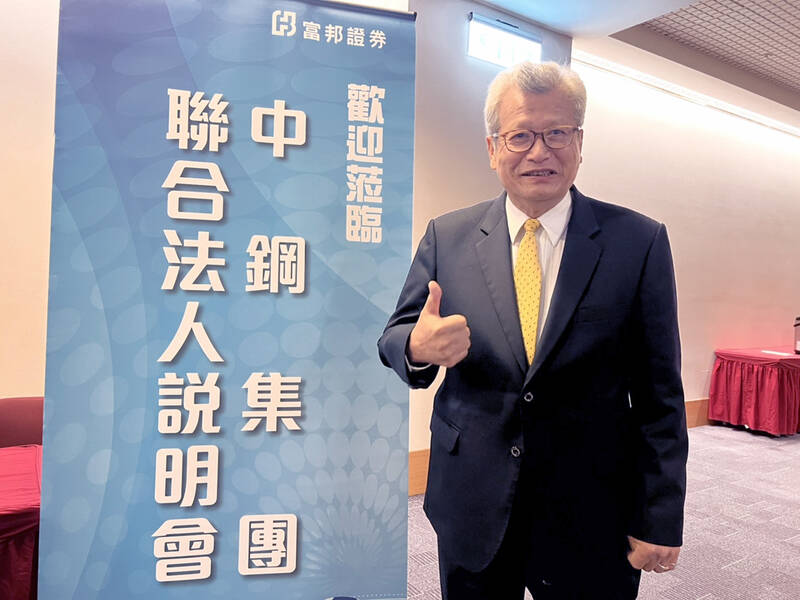China Steel Corp (CSC, 中鋼) is facing the biggest challenges in the company’s history as a sudden drop in demand is eating into its profitability, chairman Wong Chao-tung (翁朝棟) said on Tuesday.
Wong’s comments reversed his previous remarks. A few weeks earlier, Wong said demand would pick up in the second half of this year, along with a rebound in steel prices.
“We have to strive to overcome all difficulties and to reach the goal of making profits for the whole of this year,” he said in a letter to employees seen by the Taipei Times.

Photo: Lin Jin-hua, Taipei Times
China Steel swung back to pretax profit of NT$42 million (US$1.3 million) last month. During the first eight months of the year, its cumulative pretax profit fell 96 percent year-on-year to NT$1.32 billion.
In 2020, the Kaohsiung-based company was on the brink of losing money due to COVID-19 pandemic shutdowns, but it eked out a profit of NT$886 million, or earnings per share of NT$0.05, for the year.
The company is facing an even more dire situation this year after steel demand sank suddenly in the second half of last year, Wong said in the letter.
The US-China trade standoff, ongoing Ukraine war and interest rate hikes by central banks have weakened the world economy, which led to a plunge in steel demand, he said.
“The situation this year is worse than the slump in 2020,” Wong said.
As the latest industrial downturn is driven by multiple and complicated factors, the company does not expect price cuts to be an effective way to stimulate demand, he said.
The business outlook is unpredictable as customers are trying to cope with gloomy demand, he said.
“China Steel is facing a double blow from shrinking shipments, and falling prices at home and abroad,” Wong said.
The company has registered marginal contributions from hot-rolled and cold-rolled steel products in Taiwan this year, Wong said.
In foreign markets, the company is struggling to make a profit due to competitive prices from Chinese rivals, he said.
About 47 percent of the company’s products were shipped to foreign markets in the first half of the year, with Europe and Southeast Asia the top two destinations, company data showed.
China Steel shares fell 2.3 percent to close at NT$25.45 yesterday, having plummeted 15.87 percent since the beginning of this year, underperforming the TAIEX, which advanced 14.67 percent over the period, Taiwan Stock Exchange data showed.

Zhang Yazhou was sitting in the passenger seat of her Tesla Model 3 when she said she heard her father’s panicked voice: The brakes do not work. Approaching a red light, her father swerved around two cars before plowing into a sport utility vehicle and a sedan, and crashing into a large concrete barrier. Stunned, Zhang gazed at the deflating airbag in front of her. She could never have imagined what was to come: Tesla Inc sued her for defamation for complaining publicly about the vehicles brakes — and won. A Chinese court ordered Zhang to pay more than US$23,000 in

‘LEGACY CHIPS’: Chinese companies have dramatically increased mature chip production capacity, but the West’s drive for secure supply chains offers a lifeline for Taiwan When Powerchip Technology Corp (力晶科技) entered a deal with the eastern Chinese city of Hefei in 2015 to set up a new chip foundry, it hoped the move would help provide better access to the promising Chinese market. However, nine years later, that Chinese foundry, Nexchip Semiconductor Corp (合晶集成), has become one of its biggest rivals in the legacy chip space, leveraging steep discounts after Beijing’s localization call forced Powerchip to give up the once-lucrative business making integrated circuits for Chinese flat panels. Nexchip is among Chinese foundries quickly winning market share in the crucial US$56.3 billion industry of so-called legacy

Taiwan Semiconductor Manufacturing Co (TSMC, 台積電) yesterday held its first board of directors meeting in the US, at which it did not unveil any new US investments despite mounting tariff threats from US President Donald Trump. Trump has threatened to impose 100 percent tariffs on Taiwan-made chips, prompting market speculation that TSMC might consider boosting its chip capacity in the US or ramping up production of advanced chips such as those using a 2-nanometer technology process at its Arizona fabs ahead of schedule. Speculation also swirled that the chipmaker might consider building its own advanced packaging capacity in the US as part

‘NO DISRUPTION’: A US trade association said that it was ready to work with the US administration to streamline the program’s requirements and achieve shared goals The White House is seeking to renegotiate US CHIPS and Science Act awards and has signaled delays to some upcoming semiconductor disbursements, two sources familiar with the matter told reporters. The people, along with a third source, said that the new US administration is reviewing the projects awarded under the 2022 law, meant to boost US domestic semiconductor output with US$39 billion in subsidies. Washington plans to renegotiate some of the deals after assessing and changing current requirements, the sources said. The extent of the possible changes and how they would affect agreements already finalized was not immediately clear. It was not known